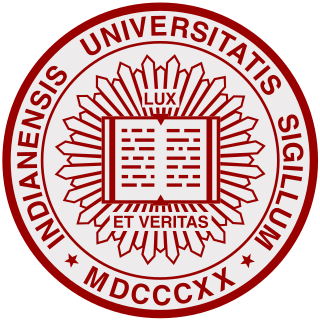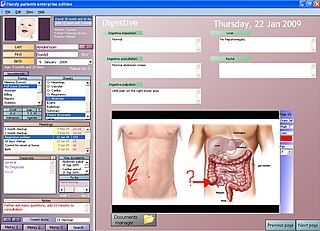
Indiana University Bloomington is a public research university in Bloomington, Indiana. It is the flagship campus of Indiana University and, with over 40,000 students, its largest campus.

Health informatics is the field of science and engineering that aims at developing methods and technologies for the acquisition, processing, and study of patient data, which can come from different sources and modalities, such as electronic health records, diagnostic test results, medical scans. The health domain provides an extremely wide variety of problems that can be tackled using computational techniques.
The International Medical Informatics Association (IMIA) is an independent organization that plays a role in promoting and furthering the application of information science in modern society, particularly in the fields of healthcare, bioscience and medicine. It was established in 1967 as a technical committee of the International Federation for Information Processing (IFIP). It became an independent organization in 1987 and was established under Swiss law in 1989.

An electronic health record (EHR) is the systematized collection of patient and population electronically stored health information in a digital format. These records can be shared across different health care settings. Records are shared through network-connected, enterprise-wide information systems or other information networks and exchanges. EHRs may include a range of data, including demographics, medical history, medication and allergies, immunization status, laboratory test results, radiology images, vital signs, personal statistics like age and weight, and billing information.

The Medical College of Wisconsin (MCW) is a private medical school, pharmacy school, and graduate school of sciences headquartered in Milwaukee, Wisconsin. The school was established in 1893 and is the largest research center in eastern Wisconsin. It is associated with Froedtert Hospital as well as Children's Hospital of Wisconsin and houses the Center for Infectious Disease Research There are two additional campuses, one in Green Bay and one in Wausau.
Biomedical text mining refers to the methods and study of how text mining may be applied to texts and literature of the biomedical domain. As a field of research, biomedical text mining incorporates ideas from natural language processing, bioinformatics, medical informatics and computational linguistics. The strategies in this field have been applied to the biomedical literature available through services such as PubMed.

Gunther Eysenbach is a German-Canadian researcher on healthcare, especially health policy, eHealth, and consumer health informatics.
The Journal of Medical Internet Research is a peer-reviewed open-access medical journal established in 1999 covering eHealth and "healthcare in the Internet age". The editors-in-chief are Gunther Eysenbach and Rita Kukafka. The publisher is JMIR Publications.
Edward ("Ted") Hance Shortliffe is a Canadian-born American biomedical informatician, physician, and computer scientist. Shortliffe is a pioneer in the use of artificial intelligence in medicine. He was the principal developer of the clinical expert system MYCIN, one of the first rule-based artificial intelligence expert systems, which obtained clinical data interactively from a physician user and was used to diagnose and recommend treatment for severe infections. While never used in practice, its performance was shown to be comparable to and sometimes more accurate than that of Stanford infectious disease faculty. This spurred the development of a wide range of activity in the development of rule-based expert systems, knowledge representation, belief nets and other areas, and its design greatly influenced the subsequent development of computing in medicine.
Pulsus Group is a health informatics and digital marketing company and publisher of scientific, technical, and medical literature. It was formed in 1984, primarily to publish peer-reviewed medical journals. As of 2016, Pulsus published 98 hybrid and full open-access journals, 15 of which had been adopted as the official publications of related medical societies. Pulsus Group also conducts conferences in association with scientific societies.
The American Medical Informatics Association (AMIA), is an American non-profit organization dedicated to the development and application of biomedical and health informatics in the support of patient care, teaching, research, and health care administration.
Health information technology (HIT) is health technology, particularly information technology, applied to health and health care. It supports health information management across computerized systems and the secure exchange of health information between consumers, providers, payers, and quality monitors. Based on a 2008 report on a small series of studies conducted at four sites that provide ambulatory care – three U.S. medical centers and one in the Netherlands, the use of electronic health records (EHRs) was viewed as the most promising tool for improving the overall quality, safety and efficiency of the health delivery system.
Informatics is the study of computational systems. According to the ACM Europe Council and Informatics Europe, informatics is synonymous with computer science and computing as a profession, in which the central notion is transformation of information. In other countries, the term "informatics" is used with a different meaning in the context of library science, in which case it is synonymous with data storage and retrieval.

Philip Eric Bourne is an Australian bioinformatician, non-fiction writer, and businessman. He is currently Stephenson Chair of Data Science and Director of the School of Data Science and Professor of Biomedical Engineering and was the first associate director for Data Science at the National Institutes of Health, where his projects include managing the Big Data to Knowledge initiative, and formerly Associate Vice Chancellor at UCSD. He has contributed to textbooks and is a strong supporter of open-access literature and software. His diverse interests have spanned structural biology, medical informatics, information technology, structural bioinformatics, scholarly communication and pharmaceutical sciences. His papers are highly cited, and he has an h-index above 50.

Timothy J. Broderick, F.A.C.S., is Professor of Surgery and Biomedical Engineering at the University of Cincinnati, where he has served on the faculty since 2003. He also serves as Chief of the Division of Gastrointestinal and Endocrine Surgery and is Director of the Advanced Center for Telemedicine and Surgical Innovation (ACTSI). He has flown on the NASA KC-135 parabolic laboratory and dived in the NASA Extreme Environment Mission Operations (NEEMO) program to develop advanced surgical technologies for long duration space flight.

The Wikipedia online encyclopedia has, since the late 2000s, served as a popular source for health information for both laypersons and, in many cases, health care practitioners. Health-related articles on Wikipedia are popularly accessed as results from search engines, which frequently deliver links to Wikipedia articles. Independent assessments have been made of the number and demographics of people who seek health information on Wikipedia, the scope of health information on Wikipedia, and the quality of the information on Wikipedia.

Christopher G. Chute is a Bloomberg Distinguished Professor at Johns Hopkins University, physician-scientist and biomedical informatician known for biomedical terminologies and health information technology (IT) standards. He chairs the World Health Organization Revision Steering Group for the revision of the International Classification of Diseases (ICD-11).

Sethuraman Panchanathan is an Indian-American computer scientist and academic administrator, and the 15th Director of National Science Foundation since June 2020. He previously served as the Executive Vice President, ASU Knowledge Enterprise Development and Chief Research and Innovation Officer at Arizona State University (ASU). He was also Director of the Center for Cognitive Ubiquitous Computing (CUbiC), Foundation Chair of Computing and Informatics at ASU and Professor in the School of Computing, Informatics, and Decision Systems Engineering (CIDSE), part of the Ira A. Fulton Schools of Engineering.

Lucila Ohno-Machado is a biomedical engineer and the chair of the Department of Biomedical Informatics and associate dean for informatics and technology at UC San Diego. She is an elected member of the American Society for Clinical Investigation and the National Academy of Medicine.










